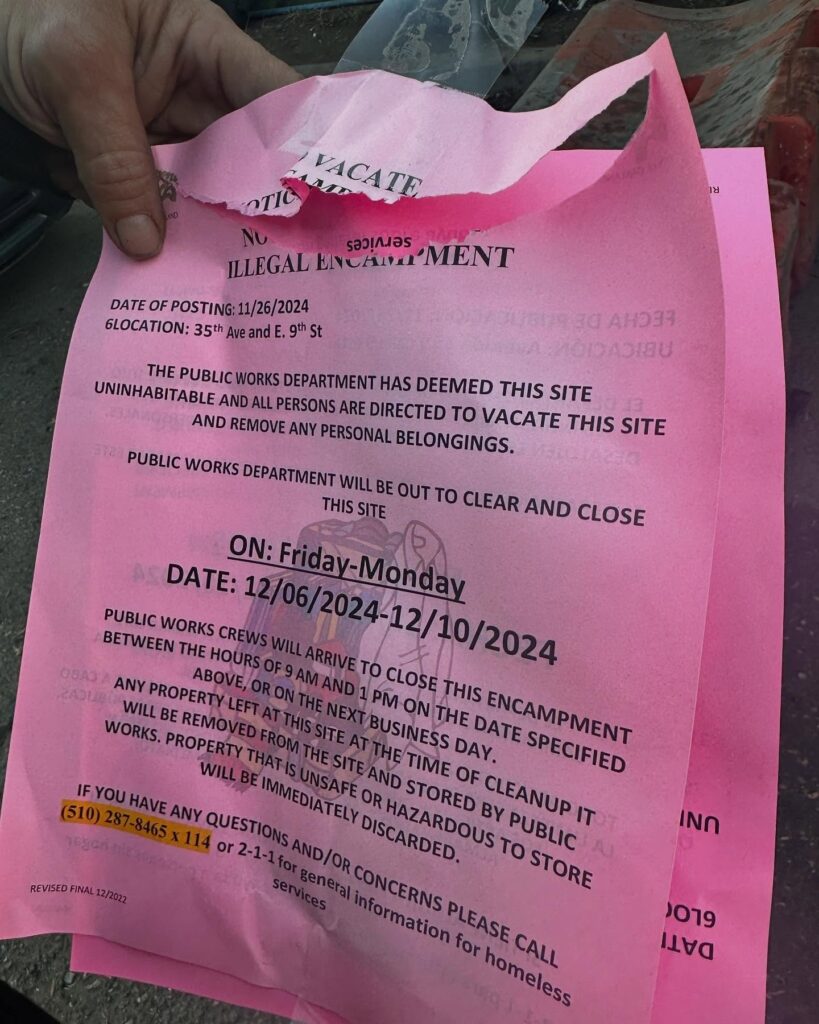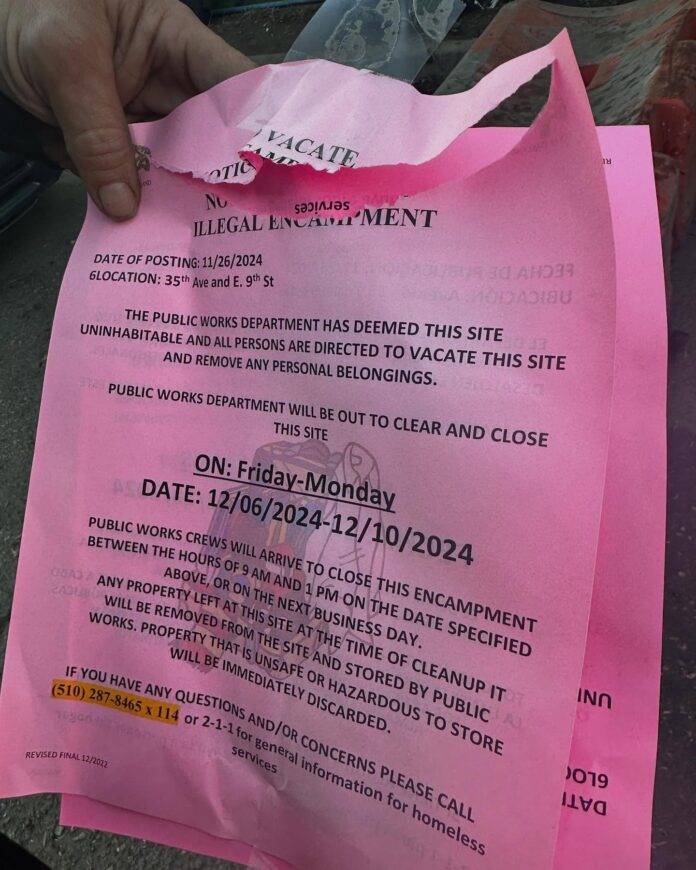“You can’t sit here.”
“But it’s a park bench, they are sitting down,” I said pointing to a yuppie couple two benches away making out.
A park ranger with a gun and mace on his holster was towering over me and my mama in Golden Gate Park. We had walked for hours deep into the recesses of the park to find a good hiding place, but somehow they found us. This was just one of countless times we were harassed for being houseless in “public.”

Throughout me and my mama’s life of homelessness we were always hiding—houseless families have always risked incarceration and separation if we are “seen” in the co-called public. But what was even more full of hypocrisy was the settler lie of “public” itself.
We were sitting in the daytime on a public bench surrounded by other people sitting on a public bench eating their lunches or brunches or resting or watching their children play. And yet me and mama were always targeted and threatened and harassed. How were we different? Was it our old clothes, our skin, our hair? Our carefully rolled up sleeping bag, tucked near our feet, or our telltale over-stuffed backpack and adjoining hefty bag with that day’s collection of recycled bottles and cans?
The word Public comes from the Old French word public (c. 1300) and directly from Latin publicus “of the people; of the state; done for the state,” also “common, general, of or belonging to the people at large; ordinary, vulgar,” and as a noun, “a commonwealth; public property.
As early as 1640 the Stealing fathers (Founding Fathers) were using the word “public” to describe the “vulgar” regular people. To describe poor, disabled, houseless, migrant/indigenous, Black and brown poor people.
Today the word public is used and abused as a lie, a cover for encroachment and displacement. It’s also a cover for an open form of class apartheid. Demanding implicit and explicit bias about who the “public” is and where they get to be versus the rest of us.
The concept and word “public” is abused and co-opted from the people to describe heavily raced, classed and ableized spaces on Mama Earth, allegedly “owned” by the state. The funny thing: Isn’t the “state” supposed to also mean “the people?”
In actuality the concept of the “state” began with feudal societies ruled over by kings and gentry, which birthed the settler colonizers who stole Turtle Island, re-named it and committed genocide on the First Peoples of this land. The colonizers never intended public to mean the people’s land, or belonging to the public.
Now hundreds of Gregorian years later we are functioning with the same set of lies and a new set of violence against the actual public.
In every settler town on Turtle Island after the Grants Pass v. Johnson ruling we houseless people struggle with the already existent class-based apartheid implemented in the so-called public with an extra literal kick of now claiming that houseless residents of any state or city are no longer protected under the 8th amendment of the Constitution, which effectively means we are not really seen as humans at all. The violent state sponsored sweeps continue to rain down on our heads, we aren’t allowed to sit anywhere, we aren’t allowed to rest or sleep—and god forbid we sit in the same so-called “public” spaces as the “other” housed, wealthy, and able public.
“They have been sweeping almost everyday,” Joe X who used to stay on 35th and 9th street near Fruitvale, told me yesterday morning as he was shivering in 35 degree cold while hastily moving his belongings in one of a series of violent sweeps launched in Oakland after Grants Pass. “We had just left West Grand and MLK and now they are here. I really don’t know where to go.”
Two months ago, the advocates and warriors at Where Do We Go set up a resistance community for houseless relatives and refused sweeps orders, given to them from the allegedly progressive city of Berkeley and instead launched three other communities (I don’t call them “encampments;” that’s a military industrial complex word and we are just trying to rest and be safe). Inspired by their warrior work, several of us houseless/formerly houseless residents of the so-called State of California who are currently being or have been violently swept for resting, sitting, standing, or sleeping in the not -really public will be launching a series of Sweeps Free Sanctuary ComeUnities and other activities on “public land” on December 17th.
“Public land should be for the public, instead we face violent sweeps,” said La Monte Ford, Wood Street Commons Sweeps survivor.
In addition to providing crucial resources for fellow houseless relatives in the cold, wet winter, in settler towns across this stolen land from so-called San Francisco to Oakland to LA and all the way up to Seattle our Sanctuaries will be presenting solutions to homelessness created by us houseless people. Solutions that are healing housing sanctuaries like Homefulness and Wood Street Commons Community and Tent City 3 in Seattle.
“It took several years of fighting and not giving up, but now we have an agreement with the city to set up self-governed (that’s houseless peoples governing ourselves) tent cities in Seattleai,” said Anitra, one of the formerly houseless co-founders of SHARE/WHEEL to Poor Peoples Radio podcast. From Share/WHEEL’s website:
Up to 350 people each night find safety, shelter, dignity, and respect in our self-managed shelters and Tent Cities. After years of struggle, community education, and negotiation we established the first Tent City in a suburban area in May 2004. Overcoming initial intense public opposition, we negotiated with King County to define and establish land use standards for temporary homeless encampments.
Tent Cities aren’t a permanent solution. But they are an actual realization of public space for all of the public and a safe place to rest and to sleep and therefore should be implemented immediately in all of California (and all across occupied Turtle Island) where we are literally dying from these ongoing and violent sweeps to nowhere perpetrated in all these settler towns.
“We set up Tent Cities on either public or private locations in Seattle,” concluded Anitra.
This anti-poor people-in-public violence manifest in endless sweeps that cause houseless elders and disabled communities to become sicker, more destabilized and more prone to serious illness.
In San Francisco, Mayor London Breed blocked the use of public funds for social housing projects like Homefulness, which we proposed for SF. In Oakland, Mayor Tao decided to take the “cleaning order” of the Newsom Administration a step further and is, as I write, systematically sweeping every single person outside all day every day.
My mama used to wonder how to “not look homeless.” It became an obsession of hers, and even when we got access, at least temporarily to a roof, she was always looking over her shoulder for the next cop to harass us for the sole act of sitting down in public
Over the years, more anti poor public hate has materialized, from the sweeps, to the endless tows of people’s homes on wheels, to violent architecture, spikes and bumps, and planters and concrete rocks wherever us poor public might need or wat to sit down or rest. All of these hateful measures sending a clear message that public space is NOT for ALL the public.

Please join houseless /formerly houseless leaders at POOR Magazine and Wood Street Commons in Huchiun (Oakland) at 3pm and San Francisco at 11am on December 17th as we launch Sweeps-free Sanctuary come-unities on both sides of the occupied bay. For more information or to sign up to help, email poormag@gmail.com







